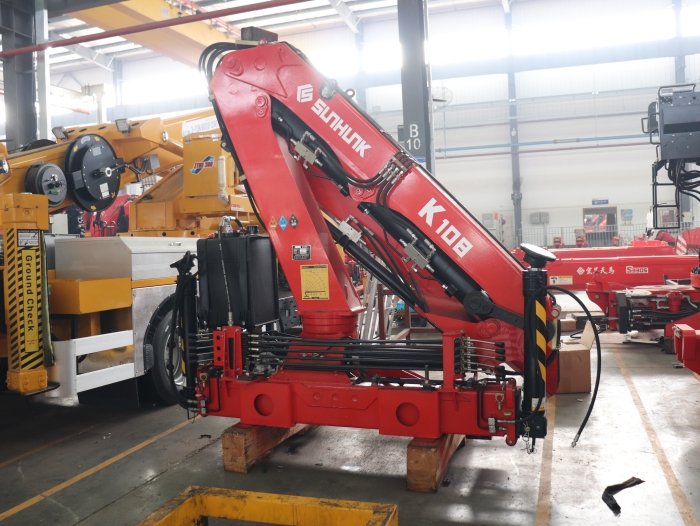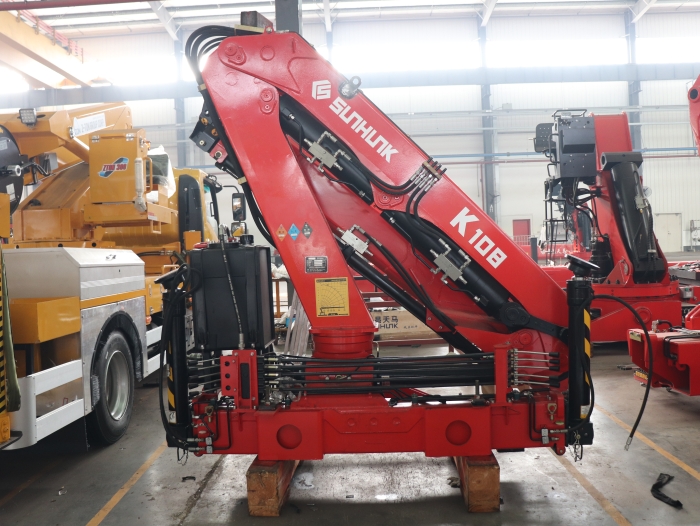- PRODUCTS
- SOLUTION
- SERVICE
- NEWS
- ABOUT US
Selecting the right lorry crane for your project is not just about having the right tool for the job; it's about maximizing productivity, ensuring safety, and optimizing your investment. As you delve into the world of lorry cranes, you'll discover how technological advancements and strategic planning can transform your operations, whether you're in construction, logistics, or another industry altogether. This guide will walk you through essential considerations and insider tips to help you leverage lorry cranes for your business's success.
When you're determining the most suitable lorry crane for your task, begin by assessing the maximum weight of the materials you’ll handle. This weight, along with the distance from the crane's center, dictates the capacity needed.
For example, a 20-ton crane can handle 8.7 tons at 4 meters from its center. It's crucial to match crane capacity not only to the weight but also to the logistics of your worksite, ensuring that the crane you choose can reach where it's needed without overcapacity that could raise your costs unnecessarily.

Boom length is another critical factor. Depending on how far and how high you need to lift materials, the boom must be extendable enough to accommodate these requirements. Some cranes offer up to 8-boom extensions, reaching lengths beyond 30 meters. The longer the boom, the more versatile the crane, yet the capacity may decrease as the boom extends. Plan carefully to balance extension needs with lifting capacity for optimal efficiency.
The rental rates for lorry cranes can vary widely, influenced by factors such as crane capacity, boom length, technological features, and included services. Basic models may start as low as $60/hr, while sophisticated ones with fly jibs and stability control systems can command rates of $300/hr or more. When considering rates, factor in not just the hourly cost but also the efficiency gains from the right equipment that can complete your task faster and more safely.
Modern lorry cranes may come equipped with fly jibs and winches, enhancing their reach and versatility. Fly jibs offer additional length and angle flexibility, perfect for complex lifts, especially at height or in tight spaces. Winches add lifting power and control. Although these add-ons might reduce the crane's maximum capacity, they allow for greater precision and range, proving that the right technology can be a game-changer.
Stability control systems, such as the AJK Stability Control System (SCS) or Fassi Stability Control (FSC) System, are indispensable for safe crane operations. These systems adjust lifting capacity based on the extension of the outriggers and sometimes even the payload's position. By investing in a crane with a stability control system, you're not only ensuring a safer worksite but also preventing potential accidents and associated costs.
The dimensions of a lorry crane play a vital role, especially when navigating through urban areas or confined spaces. Understanding the crane's length, width, height, and stabilizer spread is essential for planning and maneuvering. Be sure to obtain this information beforehand and consider it when planning your project logistics to ensure seamless operations.
Before deploying a lorry crane, conducting a thorough site survey is key. It helps identify potential obstacles, determines the best crane placement, and informs the necessary crane configuration. Without this step, unforeseen challenges could delay your project or even compromise safety. Take advantage of a rental company's experience in performing these surveys to get ahead of any issues.

Maximizing the use of your lorry crane involves more than just adequate lifting power. It's about how effectively you position and utilize the crane throughout its operation. Strategic placement can reduce movement time between lifts, optimize loading and unloading processes, and decrease overall project duration. Experienced operators can make all the difference in ensuring efficient utilization.
Tackling the bureaucracy of permits and ensuring that skilled operators are at the helm are aspects that can't be overlooked. Rental services can often handle permit applications and provide licensed drivers, leaving you free to focus on the job at hand. This seamless approach not only saves time but also ensures all regulatory requirements are met without hassle.
While lorry cranes are synonymous with construction, their versatility extends into areas like transport logistics, enabling the movement of heavy loads over long distances. In landscaping, they can maneuver large trees and materials into precise positions, enhancing both functionality and aesthetics.
Marine operations often depend on lorry cranes to manage the shifting and lifting of cargo in docks and shipyards. In manufacturing, these cranes facilitate the assembly of heavy machinery and equipment where fixed cranes are not available or practical.
Lorry cranes can also provide tailored solutions for waste management operations, handling and transporting large bins or specialized equipment for environmental services.